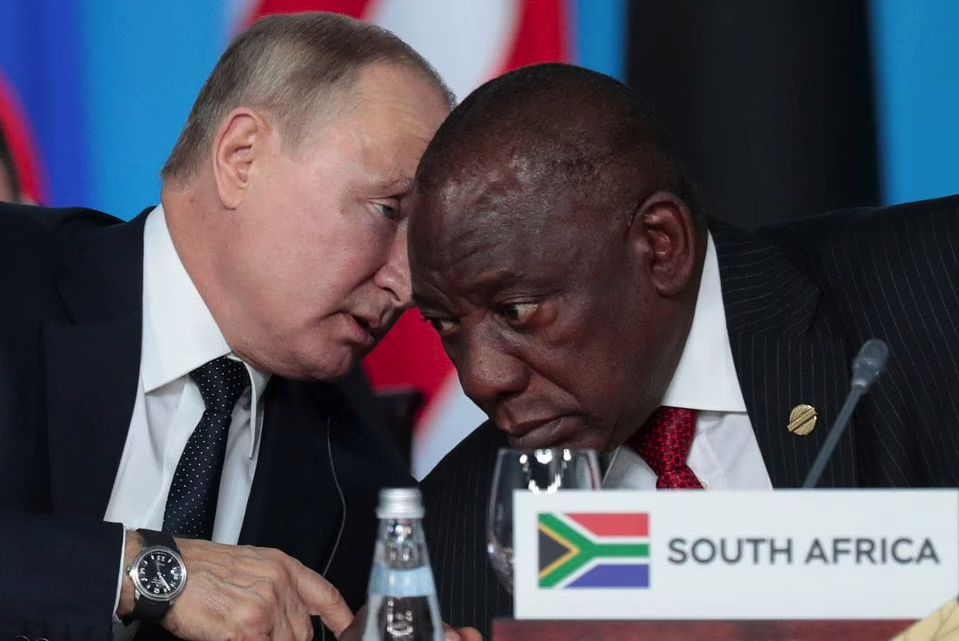
Published 28/05/2023 17:27 | Edited 5/30/2023 1:26 PM
Journalist Alec Russell of the Financial Times, one of the world’s leading economic newspapers, wrote an article nodding to the perception that “the time has come for the Global South”. As he himself says, “new world orders are easier to declare than to realize”, as has happened before. But the way in which the less developed hemisphere has been imposing its geopolitical will is something that “has been visible in many arenas since the old globalized order began to fragment after the 2008 financial crisis”, but the war in Ukraine has intensified this process. .
Russell cites the case of South Africa and its efforts to mediate the conflict in Ukraine, as well as other characters. Although there is a certain contempt today for this attitude of the nations of the Global South, the “post-unipolar” future may make the mention of these positions more significant than is currently imagined.
“The idea of six African heads of state crossing the front lines of a European war is not only a telling counterpoint to all Western interventions in Africa over the years, but also underscores the accelerating assertiveness of countries in the “Global South” — and his feeling that his time really may have finally come”, says Russell in the article of the last day 21.
Read also: Deglobalization and Mercosur, the Opportunity for the Insertion of a Peripheral Block
game of interests

O red portal consulted the specialist in International Relations, Flávia Loss Araújo (FESPSP), about this perception of the British newspaper. She said she agreed with the renewed strength of the Global South after the outbreak of the Ukraine War.
“The reading of the Western press (read Europe and the United States) at the beginning of the war was that the countries that did not place themselves totally in favor of Ukraine disrespected the basic rules of the international system because they themselves had authoritarian biases or little adherence to the UN Charter. What is beginning to be perceived now, with less moral judgments and more pragmatism, is that the countries of the so-called Global South are guiding their alignment according to their interests and taking advantage of the moment to put their demands for changes in the order on the agenda. international market that had been stopped for decades”, she analyzes.
Russell says as much when he points out that nations that are not aligned against Russia, “have seen hypocritical powers once again prioritizing their own interests and concerns over big global issues such as health and climate change”.
Read also: Goodbye to the dollar: after the Brics, the Middle East advances in de-dollarization
However, he sees a conspiracy plot, in which the South sees the opportunity to put the US and China in opposition. That’s what was said, for example, when Lula went to China, closed much better deals and ended up provoking an advantageous reaction from the US, which decided to increase the contribution to the Amazon Fund. But the biggest opportunity, most evident and declared, would be “a long overdue rewrite of the post-1945 world order”. Once again, Brazil is the biggest demander for a reform of multilateral organizations such as the UN Security Council, still with a post-war face.
BRICS as target
Russell also bets on an intrigue between the members of the BRICS, in this new context. For him, the interests are conflicting, between China and India, for example, and may come to the fore at the bloc’s summit in Durban (South Africa), which he thinks will be “a showcase of contradictions”. He still thinks that this alliance may not be promising, perhaps because it is out of line with the western order and also involves very different countries. In addition to believing that China can turn the bloc into its “little club”.
Professor Flávia, in turn, prefers to look at what is more immediate and evident, instead of speculating so far away. For the international analyst, this is a strategy on the part of these developing countries, which see no advantage in following the position of the Europeans and North Americans in the conflict without there being any counterparts.
Read also: Lula wants the Brics bank bigger than the World Bank
“Adhering to sanctions or falling out with Russia would not bring advantages to countries like South Africa. One might question whether they should engage in direct support for Russia, as the South Africans are doing against US wishes. I don’t think it’s the most appropriate attitude and Brazil, for example, refuses to send weapons to the belligerents, which seems to me a more sensible attitude”, she defended.
The columnist of FT it also admits that there are common interests and objectives in the bloc, such as the reform of multilateral organizations, rethinking the hegemony of the dollar and the system of economic sanctions, which are always imposed according to the will of the Americans. He regards these as goals that have evolved to be quite tangible. The idea of trading with each other in sovereign currencies seems to be the one that raises the hair of Bretton Woods supporters the most.
Flávia agrees that an international order is needed based on rules that are truly international and no longer dictated by western countries. “Anyway, we have to keep in mind that these countries will be an important part of whatever order arises and that they can be part of the solution”, she says, defending that reinforcing the interests of the Global South does not need to be a provocation to the G7, “ which continues to be the most powerful group of countries with which we have important political and economic relations”.
Read also: Lula criticizes IMF “bindings” and defends the Brics’ own currency
In addition, the political scientist recalls that, after the pandemic, it became evident that the contribution of all countries will be necessary for humanity to overcome the challenges that are emerging.
bold agenda
On the other hand, Flávia considers the agenda that Russell proposes for rich countries to be modest. According to him, the G7 should “lead by example, commit to reforms of the global order” and not offend and treat the poorest with paternalism, saying they are “undecided” about Ukraine, as Washington has said.
Meanwhile, the US closes regional alliances tailored to its interests (I2U2 and Quad), in a demonstration that it does not even listen to the needs and complaints of those involved, as it already does with Europe. The problem is that China has also made these alliances of interest, in his opinion.
For the analyst, it is clear that this new “non-aligned” movement wants and needs more than that. “The glaring inequality and the feeling of injustice towards developed countries, which gained a lot from the rules they imposed on the rest of the world, must be confronted and a new understanding of international cooperation needs to emerge. I’m not talking about help, I’m talking about concrete efforts that change the reality of the planet”, explains Flávia, citing low vaccination rates in Africa as an example of how rich countries treat the periphery of the world.
Read also: BRICS China 2022 eases worries about world peace and development
Russell concludes by assessing the attitude of the South Africans as reckless in abandoning neutrality in the war, but he praises the postures of India or Indonesia, which may have more opportunities in a new, less polarized order.
“The pandemic proved that problems know no borders and that solutions need to be joint. It is necessary that the richest 10% of the global population that are concentrated in Europe and North America understand this, too”, concluded professor Flávia, about what really matters for the Global South.
Source: vermelho.org.br

